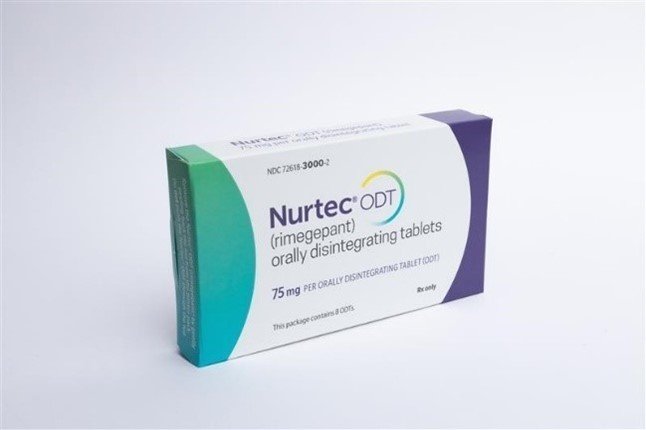Nurtec ODT (Rimegepant)
Nurtec ODT is a medication that treats migraines. It can be used both to stop a migraine when it starts and to prevent future migraines. Nurtec comes as an easy-to-use tablet that dissolves in your mouth without needing water, making it convenient to take anywhere. It helps reduce migraine symptoms like headache pain, light sensitivity, nausea, and sound sensitivity.
How Nurtec ODT Works
Nurtec ODT works by blocking CGRP receptors, which play a critical role in migraine attacks. CGRP is a protein that is released during a migraine, causing inflammation and dilation of blood vessels in the brain. By inhibiting these receptors, Nurtec helps reduce pain and other migraine-related symptoms. It is not only used to relieve acute migraine attacks but can also be taken every other day to prevent episodic migraines.
Learn more about migraines and other treatment options here.
Dosage and Administration
Nurtec ODT is administered as a single 75 mg orally disintegrating tablet (ODT) that dissolves on the tongue without the need for water. It can be taken at the onset of a migraine attack for immediate relief or every other day to prevent episodic migraines. No more than one dose should be used within 24 hours, and it is not recommended to take more than 18 doses per month for migraine prevention.
Important: Allow the tablet to dissolve completely on the tongue before swallowing. Do not take more than the prescribed dose within 24 hours.
Side Effects
Like any medication, Nurtec ODT may cause side effects. The most common side effects include:
Nausea, is reported by approximately 2% of users.
Hypersensitivity reactions, such as rash or swelling, are reported in a small percentage of users.
Stomach pain or indigestion.
In rare cases, users may experience more serious side effects, including allergic reactions like facial swelling, hives, or difficulty breathing. If you experience any severe side effects, discontinue use and contact your healthcare provider immediately.
For more detailed information, you can visit the Nurtec official website.
Important Safety Information
Allergic Reactions: Nurtec ODT should not be used by individuals with a known allergy to rimegepant or any of its ingredients. Serious allergic reactions, including swelling of the face or throat, have been reported in rare cases.
Liver and Kidney Conditions: Patients with severe liver or kidney impairment should avoid using Nurtec ODT, as safety data in these populations is limited. Consult your healthcare provider for alternative treatments.
Pregnancy and Breastfeeding: There is limited data on the use of Nurtec ODT in pregnant or breastfeeding women. If you are pregnant, planning to become pregnant, or breastfeeding, discuss the risks and benefits of using Nurtec with your doctor.
Drug Interactions: Nurtec ODT may interact with CYP3A4 inhibitors or inducers, affecting how the drug works. Always inform your healthcare provider about any other prescription, over-the-counter medications, or supplements you are taking.
For more safety details, please refer to the Nurtec official website.
Alternatives to Zyrtec
While Zyrtec offers effective relief for allergy symptoms, other treatment options may be more suitable depending on your specific needs. Common alternatives include:
Zavzpret: Like Nurtec, Zavzpret blocks CGRP activity but is available in nasal spray form, providing another option for acute migraine relief.
Triptans (e.g., sumatriptan, rizatriptan): These oral medications target serotonin receptors to reduce migraine-related pain and inflammation, commonly used for acute treatment.
Ergots (e.g., dihydroergotamine): Often used for patients who do not respond well to triptans, ergots work by constricting blood vessels and reducing inflammation associated with migraines.
Preventative Treatments: Options like Medical Botox, which is injected to reduce the frequency of migraines, are commonly used for chronic migraine sufferers. Other preventative medications include topiramate or propranolol, which help reduce the occurrence and severity of migraines but do not treat active attacks.
For more alternatives, visit our Migraine Treatment Options page.




